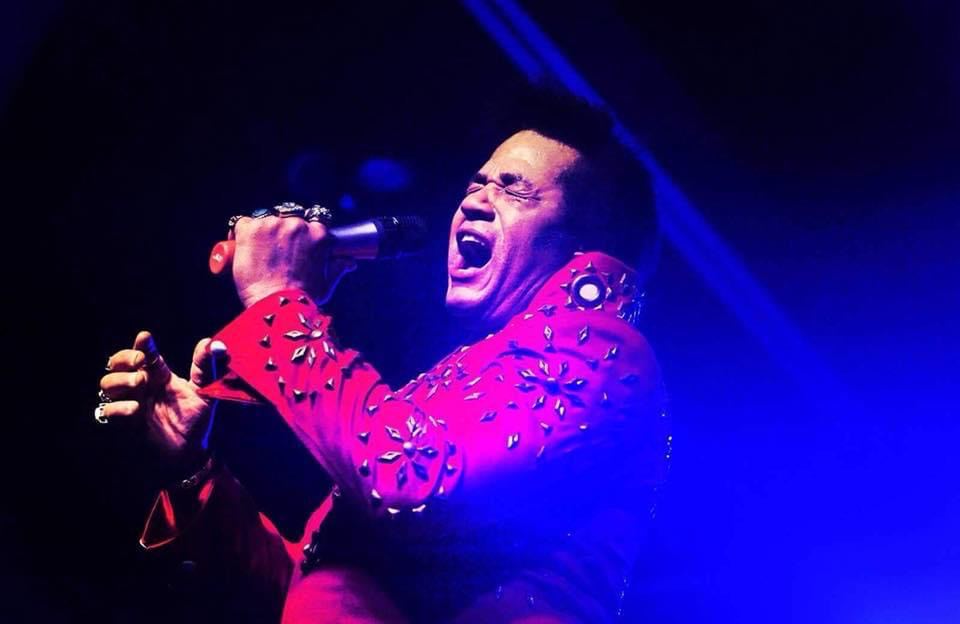
Robert Washington, Elvis impersonator.
People called Elvis “a white Negro” and a “hillbilly cat,” trying to get at the way he hung out with Black musicians, showed up at all-Black events, fused Black and White musical traditions. And now I am sitting on a bar stool at Blues City Café on Beale Street, listening to a Black singer either reclaiming the music (if you think Elvis stole it) or just celebrating what Elvis did with it.
Though he is not pretending to be the King, it helps the crowd’s fantasy that Robert Washington has high cheekbones, full lips, a clean jaw, and a strong voice. Even at sixty-three, he can move, his legs stretching wide, a film of sweat at the open neck of his sashed jumpsuit. About twenty twentysomethings from Australia are bopping and shimmying on the dance floor, and one of the guys even wiggles his hips. When Washington moves into a Beatles song, a dust of disappointment settles. But as soon as they hear “a whole lot of shakin’ goin’ on,” they are back on the floor.
“Thank you all so verrrry much,” he says over the applause, southern enough but without the fast slur that made it Elvis. Tribute is by definition bittersweet; you are listening for what you already love, wanting it to be perfect, and nothing ever is. The Black Elvis comes remarkably close, though—filling the void, bringing back the joy. A gray-haired guy from Belgium presses forward; he has followed Washington for twenty-four years, says he is “one of the best in the world.”
Washington grew up in St. Louis. In 1974, when he was sixteen, he heard Elvis Presley in concert. Three years later, he was celebrating his nineteenth birthday in U.S. Marine Corps boot camp when word came that Elvis was dead. The coincidence felt significant. He studied Elvis’s 1968 comeback and started performing. Sam Thompson, Elvis’s bodyguard for years, said Washington had captured the sound. He wound up in several tv documentaries about Elvis, and he became the first Black American to win the World Champion Elvis Impersonator title.
Nobody says “Elvis impersonator” anymore, though, because, who could? The preferred phrase is tribute artists, and the practice started back in the fifties, people grabbing the tail of his comet. A kid from Texarkana won a little fame singing “That’s All Right, Mama,” and then a sixteen-year-old started jumping onstage and imitating Elvis, who responded with good nature to both. He would have been the last person to criticize; his genius was never ex nihilo (whose is?). He had imitated blues and country and gospel musicians, instinctively blending their styles into one that felt brand-new.
By the time Elvis died, there were 170 tribute artists. In 2020, the Internal Revenue Service had record of 84,000 individuals who reported earning a living as Elvis tribute artists.
Most of them, like Washington, stick to the later King. “People wonder why everyone impersonates the old Elvis,” wrote Alanna Nash in Baby Let’s Play House. “But if a young person could do the young Elvis, they’d be a superstar. That raw talent, that incredible creature came on stage and changed everything.”
He punched a window into the American mind, too, letting in an easy breeze of acceptance. Race, class, sex, masculinity—he was generous about all of it. How he would laugh, if he could hear El Vez, the Mexican Elvis, singing, “You Ain’t Nothin’ But a Chihuahua.” Or watch Elvis Herselvis, who is lesbian, calls herself “the queen of rock ’n’ roll,” and has as backup a band called the Straight White Males. Or meet Visoot Tungarat of Thailand, who sang Elvis tributes for more than four decades. Or grin at Yoshi Suzuki, “the Japanese Elvis,” who joked about being poor and draped toilet paper around his neck instead of the trademark scarf.
As I regale a friend, a retired social worker, with these characters, she interrupts: “Do you know that at one time, I had six clients with Down syndrome, and every one of them was crazy about Elvis?”
The internet hands me an essay about Liam Doyle, who has Down syndrome and fell for Elvis at age thirteen. His parents thought it would be a passing enthusiasm—but he has since taken music and dance lessons, learned Elvis’s moves and songs, taken a performing workshop, and sung at an Elvis festival and many assisted living centers. He is on YouTube now. He yearns to win the tribute artist championship.
“Elvis’s music is in my blood,” Liam announces. He says what he loves is how much fun Elvis always had, how awesome he looked, how the girls adored him, how amazing and strong his voice was, how he made his audience feel special and loved.
His mom tells me she has “a feeling there’s something deeper.” So we talk about how Liam’s mission is to make people happy with Elvis’s music, and how happy he is, how he recoils from anger or pretense and has a spidey-sense for other people’s moods. Cheryl Doyle tells me about times he spontaneously hugged people who, it turned out, were achingly sad or hiding grief beneath their composure.
I think about how intense Elvis’s emotions were, how he poured them out for the rest of us. High spirits, lust, affection, teasing, vulnerability, loneliness, tenderness, need, all of it. He made himself easy to love. And he threw so much energy into the room, it is still vibrating, now on 84,000 wildly different wavelengths.
Read more by Jeannette Cooperman here.
